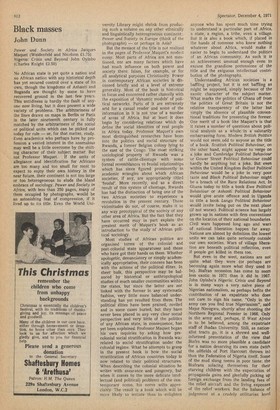Black masses
John Dunn
Power and Society in Africa Jacques Maquet (Weidenfeld and Nicolson £1.75) Nigeria: Crisis and Beyond John Oyinbo (Charles Knight E2.50) No African state is yet quite a nation and no African nation with any historical depth has yet secured control over a state of its own, though the kingdoms of Ashanti and Buganda are thought by some to have recovered ground in the last few years. This untidiness is hardly the fault of anyone now living, but it does present a wide variety of problems. The arbitrariness of the lines drawn on maps in Berlin or Paris in the later nineteenth century is fully matched by the arbitrariness of the social or political units which can be picked out today for rule -or, for that matter, study. Even academics who perhaps have by profession a vested interest in the anomalous may well be a little overcome by the shifting character of their subject matter. But
not Professor Maquet. If the units of allegiance and identification for Africans are too many and too small for most to expect to enjoy their own history in the near future, their continent is not too large or too heterogeneous to elude the bland embrace of sociology. Power and Society in Africa, with less than 250 pages, many of them occupied by photographs, would be an astonishing feat of compression, if it lived up to its title. Even the World Uni versity Library might shrink from producing such a volume on any other ethnically and linguistically heterogeneous continent: Power arid Society in Europe (think of the photographs) — or perhaps in Asia?
But the menace of the title is not realised in the pages of Professor ,Maquet's modest essay. Most parts of Africa are not mentioned, nor are many factors which have had much influence on both power and society there: Islam, for example, or for all analytical purposes Christianity. Power in contemporary African societies is discussed briefly and at a level of extreme generality. Most of the book is historical in focus and concerned rather clumsily with the exposition of 'dynamic models' of political networks. Parts of it are extremely arid for a casual reader and some of the information in it is not true of a number of areas of Africa. But at least it does begin by considering relations which do define the social identities of real people in Africa today. Professor Maquet's own most distinguished researches have been into the politics and social structure of Rwanda, a former Belgian colony lying to the east of the Congo. The most striking sociological property of Rwanda was a system of cattle-clientage with some formal resemblances to feudal relationships which has since figured prominently in academic wrangles about which African societies, if any, are appropriately titled 'feudal'. More recently, and as a direct result of this system of clientage, Rwanda has had the distinction of being one of the two African societies to experience a revolution in the present century. These vicissitudes do not, of course, make it in any way. prototypical of the society of any other area of Africa. But the fact that they have occurred may in part explain the greatest merit of Maquet's book as an introduction to the study of African political sociology. Most studies of African politics are organised terms of the colonial and post-colonial state apparatuses and those who have got their hands on them. Whether apologetic, denunciatory or simply academically appropriative, their concern has been with the actions of the political elites. In sheet bulk, this perspective may be balanced by historical or anthropological studies of much smaller communities within the states, hut since the latter are not linked with the former in any systematic fashion, very little more balanced under standing has yet resulted from them. The political elites have been praised, reviled and in some cases buried, but they have never been placed in any very clear social perspective and very little of the politics of any African state, in consequence, has yet been explained. Professor Maquet began his own inquiries by asking how precolonial social stratification in Rwanda was related to social stratification under the colonial regime. What he attempts to grasp in the present book is how the social stratification of African countries today is now related to their political structures. When describing the colonial situation he writes with assurance and pungency, but when it comes to the more delicate intellectual (and political) problems of the con temporary scene, his nerve wilts appreciably. The result is a book which will be more likely to irritate than to enlighten anyone who has spent much time trying to understand a particular part of Africa, a state, a region, a tribe, even a village. But it is also a book which, if placed in the hands of someone who knew nothing whatever about Africa, would make it easier to begin to understand the politics of an African community. As such it is an achievement unusual enough even to excuse the grandiose pretensions of the title and the exiguous intellectual contribution of the photographs.
Understanding African societies is a baffling project, but it is not baffling as might be supposed, simply because of the exotic character of the subject matter. What marks the politics of Ghana off from the politics of Great Britain is not the relative transparency of the latter but simply the absence of plausible crinventional traditions for presenting the former. One merit of a book like Maquet's is that it raises a number of questions about political analysis as a whole in a salutarily embarrassing form. Modern British Politics would not seem odd to anyone as the title of a book. Scottish Political Behaviour, on the other hand, might appear to verge on a joke and Cambridge Political Behaviour or Gower Street Political Behaviour could hardly be anything but a joke. But even within the United Kingdom Belfast Political Behaviour would be a joke in very poor taste and Bloch Political Behaviour might be a breach of the Race Relations Act. In Ghana today to title a book Ewe Political Behaviour or Ashanti Political Behaviour would give acute offence and in Uganda to title a book Lango Political Behaviour would invite being put on the next plane (if not worse). Political science has largely grown up in nations with firm conventions on the location of their national boundaries. Civil wars happened long ago and wars of national liberation happen far away. Nations are almost by definition the lowest units we can take quite seriously outside our own societies. Wars of village liberation are beneath political reflection, even if people get killed in them too.
But even in the west, nations are not quite what they were (or perhaps are becoming again more what they used to be). Biafran secession has come to seem less exotic in 1971 than it did in 1967. John Oyinbo's Nigeria: Crisis and Beyond is in many ways a very naive piece of Nigerian nationalism, as perhaps befits the
contribution of an expatriate who does not care to sign his name. "Only in the army can you find true Nigerianism", said
Major Nzeogwu, shortly after shooting the Northern Regional Premier in 1966. Only in the army and, perhaps, if West Africa is to be believed, among the expatriate staff of Ihadan University. Still, as nation
alist tracts go, it is a shrewd and well informed presentation of the view that Biafra was no more plausible a candidate
for a nation deserving its own state (with
the oilfields of Port Harcourt thrown in) than the Federation of Nigeria itself. Some of the mud slung seems in poor taste: the
Biafrans solacing themselves for their starving children with the expectation of propaganda gains , and gleefully picking up foreign exchange from the landing fees of the relief aircraft and the living expenses of the relief workers. But the balance of judgement at a crudely utilitarian level seems sane enough. There are going to be many more sophisticated studies of the Nigerian civil war and its aftermath; but for the meantime this gives a direct enough account of how the blood came to be spilt. Its very crudity may help to restrain any overhasty and complete identification with any of the larger-scale political structures in Nigeria (or indeed elsewhere).











































 Previous page
Previous page